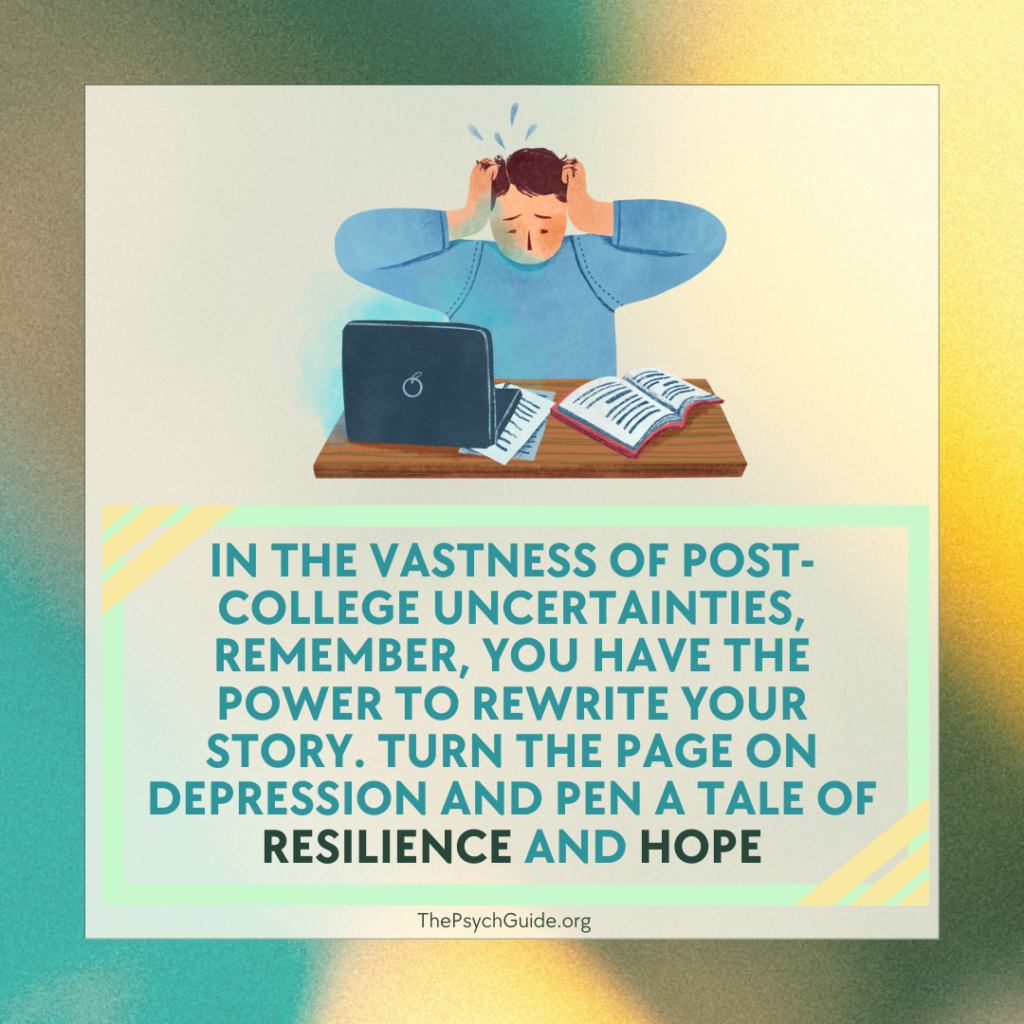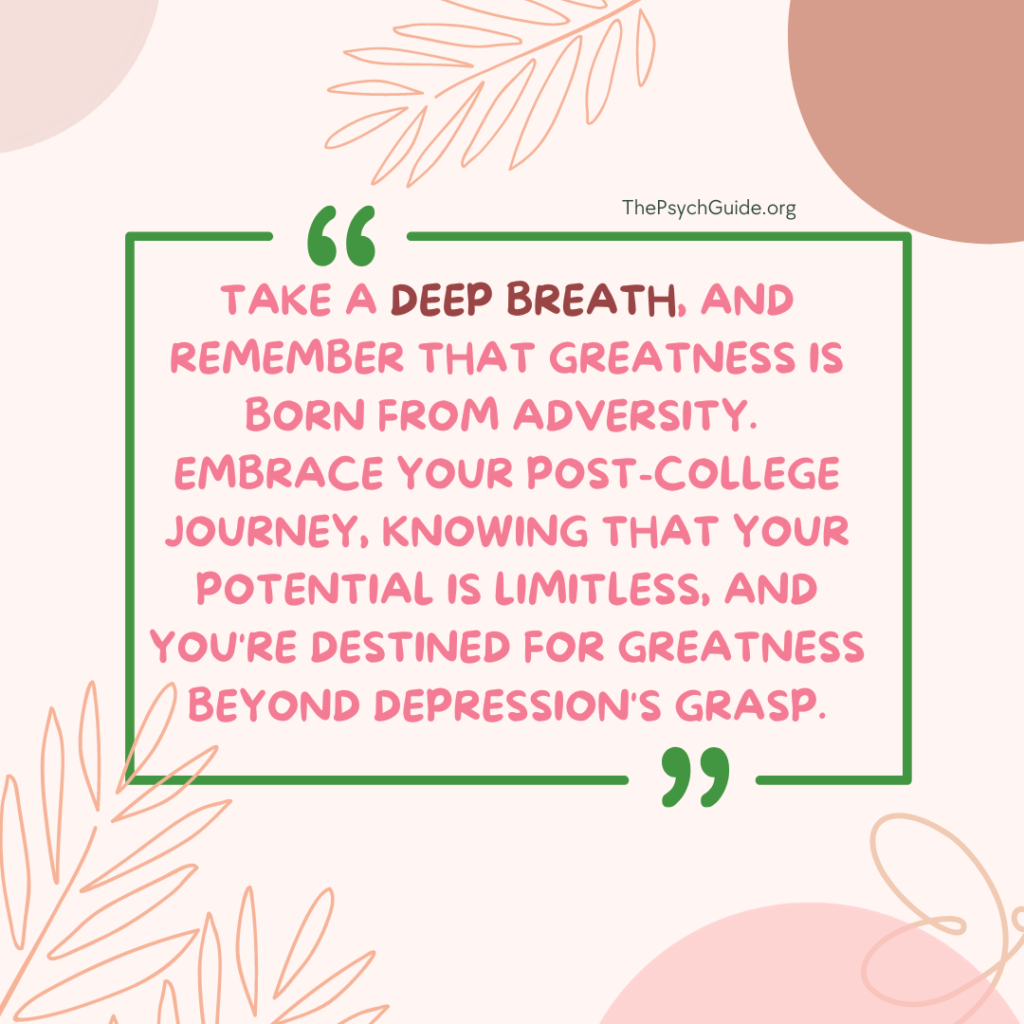So Post-College Depression symptoms brought you here, right? We know that Stepping into the post-college phase, with its promises of newfound independence and exciting opportunities, should be a time of celebration and optimism. However, for many recent graduates, this transition brings forth an unexpected emotional whirlwind known as post-college depression.
Post-college depression refers to the emotional and psychological distress that some individuals experience after graduating from college. It is essential to identify the symptoms early on to seek appropriate support and develop effective coping mechanisms.
In this article, we will delve into the often-unspoken symptoms of post-college depression, shedding light on the challenges faced by graduates as they navigate this transformative period.
Table of Contents
ToggleKey Takeaways:
- Post-College Depression is a common emotional challenge that some graduates may experience during the transition from college to the next phase of life.
- Recognizing the Post-College Depression symptoms is crucial for seeking appropriate support and developing effective coping mechanisms.
- Symptoms of Post-College Depression include an overwhelming sense of loss, uncertainty about the future, self-comparison, social isolation, and physical manifestations of emotional distress.
- Graduates should understand that experiencing a mix of emotions during this transitional period is normal, and seeking help is a sign of strength, not weakness.
- Coping strategies for Post-College Depression include seeking support from friends, family, and mental health professionals, prioritizing self-care, establishing a new routine, setting realistic goals, and exploring new opportunities.
- Graduates should remember that their journey is unique, and it’s important to focus on personal growth rather than comparing oneself to others.
- Taking care of one’s mental and physical well-being is essential during this time, including practicing self-compassion, maintaining a healthy lifestyle, and seeking professional help if needed.
- Graduates should remember that Post-College Depression is a temporary phase, and with time, resilience, and support, they can navigate this period and move forward with confidence and purpose.
- Each individual’s experience with Post-College Depression is unique, and it’s important to approach the journey with patience, self-acceptance, and a willingness to adapt and grow.
- By recognizing the symptoms, seeking support, and implementing effective coping strategies, graduates can overcome post-college depression and embrace the opportunities and challenges of their new chapter in life.
Quick Overview
Common symptoms include:
- Persistent feelings of sadness, emptiness, or hopelessness.
- Loss of interest or motivation in activities once enjoyed.
- Difficulty adjusting to new routines and responsibilities.
- Overwhelming stress or anxiety about the future.
- Social isolation or a sense of detachment from peers.
- Low self-esteem and feelings of inadequacy.
- Sleep disturbances and changes in appetite.
- Physical symptoms like fatigue or headaches

Detailed analysis of Post-College Depression Symptoms.
Graduation is a momentous achievement, yet it can also trigger a rollercoaster of emotions. Recent graduates may find themselves experiencing a mix of clashing feelings, including excitement, relief, nostalgia, and anxiety. It is important to recognize that these emotions are a normal part of the post-college transition and may lay the groundwork for potential post-college depression.
1. Persistent feelings of sadness, emptiness, or hopelessness:
Post-college depression often manifests as a prolonged sense of sadness or emotional emptiness. Graduates may experience a deep sense of loss, missing the familiarity and structure of college life. This feeling can be accompanied by a persistent sense of hopelessness about the future.
2. Loss of interest or motivation in activities once enjoyed:
A prominent symptom of post-college depression is a significant decline in interest or enthusiasm for activities previously enjoyable, socializing, and even pursuing personal goals may suddenly lose their appeal.
3. Difficulty adjusting to new routines and responsibilities:
Leaving behind the predictable routines of college life and stepping into the uncertainties of post-graduation can be overwhelming. Graduates may struggle to adapt to new routines, responsibilities, and expectations. The sudden shift in lifestyle and independence can lead to stress and anxiety.
4. Overwhelming stress or anxiety about the future:
Post-college depression often involves intense worry and anxiety about the future. Graduates may feel huge pressure to secure a job, establish financial stability, or find a clear career path. The uncertainty and competitive nature of the job market can worsen these feelings of stress and anxiety.
5. Social isolation or a sense of detachment from peers:
Leaving college means bidding farewell to a close-knit community and the support system it provided. Graduates may find it challenging to maintain relationships with friends who have dispersed geographically. This sense of isolation and detachment can contribute to feelings of loneliness and worsen depressive symptoms.
6. Low self-esteem and feelings of inadequacy:
Post-college depression can erode one’s self-esteem and self-worth. Graduates may compare themselves to their peers who seem to be achieving success or milestones more quickly, leading to feelings of inadequacy and self-doubt. The pressure to meet societal expectations or societal comparisons can further fuel these negative emotions.
7. Sleep disturbances and changes in appetite:
Depressive symptoms often affect sleep patterns and appetite. Graduates may experience difficulty falling asleep, staying asleep, or oversleeping. Similarly, changes in appetite can manifest as either a significant decrease or increase in eating habits, leading to potential weight fluctuations.
Top 7 best books for Overcoming Post-College Depression and Embracing Personal Growth.
“The Defining Decade: Why Your Twenties Matter and How to Make the Most of Them Now”
In this insightful book, Meg Jay explores the critical importance of one’s twenties and offers practical advice on how to navigate this transformative decade, including tips on career, relationships, and personal development.
“Lost Connections: Uncovering the Real Causes of Depression – and the Unexpected Solutions”
Johann Hari investigates the underlying causes of depression and provides a fresh perspective on how to address and overcome it. Drawing on extensive research, Hari offers thought-provoking insights and alternative solutions for understanding and treating depression.
Shawn Achor reveals the power of positive psychology and presents seven principles that can help individuals cultivate happiness, resilience, and success. This book provides practical strategies to reframe perspectives and unlock one’s potential for happiness and fulfillment.
“The Subtle Art of Not Giving a F*ck: A Counterintuitive Approach to Living a Good Life”
Mark Manson challenges conventional wisdom and encourages readers to embrace life’s challenges by focusing on what truly matters. With humor and candid advice, this book offers a refreshing perspective on personal growth, happiness, and finding meaning in life.
“You Are a Badass: How to Stop Doubting Your Greatness and Start Living an Awesome Life”
Jen Sincero empowers readers to overcome self-doubt and unleash their inner awesomeness. This book combines personal anecdotes, practical exercises, and motivational insights to help individuals cultivate self-confidence and live their best lives.
“Option B: Facing Adversity, Building Resilience, and Finding Joy”
Written by Facebook COO Sheryl Sandberg and psychologist Adam Grant, this book explores resilience in the face of adversity. Through personal stories and research, it offers guidance on building resilience, finding joy and navigating through difficult times.
“The Gifts of Imperfection: Let Go of Who You Think You’re Supposed to Be and Embrace Who You Are”
Brené Brown explores the power of embracing imperfections and living authentically. This book encourages readers to let go of societal expectations, cultivate self-compassion, and embrace vulnerability as a path to wholehearted living.

Post College Depression Causes and Contributing Factors:
Understanding the underlying causes and contributing factors can provide valuable insights into post-college depression. While everyone’s experience is unique, several common triggers can include:
1. Loss of structure and identity
The shift from a structured college environment to the uncertainties of the real world can lead to a loss of identity and purpose.
2. Unrealistic expectations
Pressure to immediately secure a job, find financial stability, or meet societal expectations can be overwhelming and contribute to feelings of inadequacy.
3. Financial stress
The burden of student loans, limited job prospects, and financial independence can add significant stress and anxiety.
4. Social changes
Leaving behind the close-knit college community and adjusting to new social dynamics can lead to feelings of isolation and loneliness.
5. Finding a job
Difficulty finding a job in one’s desired field or uncertainty about career goals can increase feelings of distress.
How can I treat Post-College Depression?
Post-college depression can be challenging, but there are practical strategies to help ease the transition and promote emotional well-being:
1. Seek support:
Reach out to friends, family, or mental health professionals who can provide guidance, understanding, and a listening ear.
2. Establish a routine:
Create a structured daily routine to bring stability and a sense of purpose to your post-college life.
3. Set realistic goals:
Break down long-term goals into smaller, achievable tasks to regain a sense of control and progress.
4. Practice self-care:
Prioritize self-care activities like exercise, healthy eating, quality sleep, and engaging in hobbies or interests.
5. Explore new opportunities:
Consider internships, volunteer work, or further education to enhance skills, expand networks, and explore potential career paths.
6. Manage finances:
Develop a budget and seek financial advice to alleviate stress and gain a sense of control over your financial situation.
7. Stay connected:
Maintain and foster relationships with friends, alumni networks, or professional communities to combat feelings of isolation.
8. Consider therapy or counseling:
Professional support can provide valuable tools and coping strategies to navigate this transitional phase effectively.
FAQS
What is the main cause of college students experiencing depression?
College students who don’t get enough sleep, eat poorly, or exercise insufficiently are more likely to experience sadness. Some students are compelled to drop out of college or worse by the stress associated with academic life, which includes financial concerns, pressure to land a decent career after graduation, and unsuccessful relationships.
How long does post-graduation depression last?
You can experience more crying than usual or feel depressed or hopeless. Typically, it gets better in about six months, but therapy might still help in the interim.
Is it common to feel empty after college?
It’s natural to experience some “stuckness” and discomfort after graduating, including feelings of anxiety and melancholy. It’s a shift, and dealing with change may be very difficult.
What can I do to avoid being alone after college?
I’ve found it easier to avoid feeling stuck in the past by catching up with an old friend from high school and making an effort to establish new ones. A broad collection of friends can make you happier and help you concentrate on the future.
After college, do people experience depression?
According to the medical journal, Addictive Behaviors Reports, depression in young adults frequently develops soon after they finish their university courses, frequently as a result of pressure to find employment quickly or sadness over leaving their college friends and life behind.
Why does it make me sad to be graduating?
Separation anxiety is brought on by stressors and life events like graduation. It can be challenging to adjust to your new situation if you are mourning your “old” life and are experiencing feelings of loss. Even if you are excited about your newfound independence, it’s common to experience anxiety and/or melancholy as you adjust to your situation.
Conclusion:
Recognizing the post-college depression symptoms is the first step towards overcoming its challenges. By understanding the emotional rollercoaster, sense of loss, uncertainty, self-comparison, social isolation, and physical manifestations, recent graduates can develop effective coping strategies.
It is crucial to prioritize self-care, seek support from loved ones and professionals, and remember that this transitional period is a normal part of the journey towards personal growth.
Embracing these challenges with resilience and seeking help when needed will empower graduates to navigate post-college life with strength and optimism.

